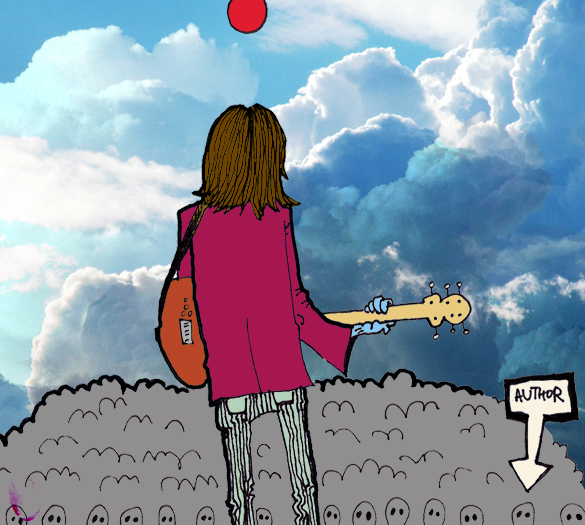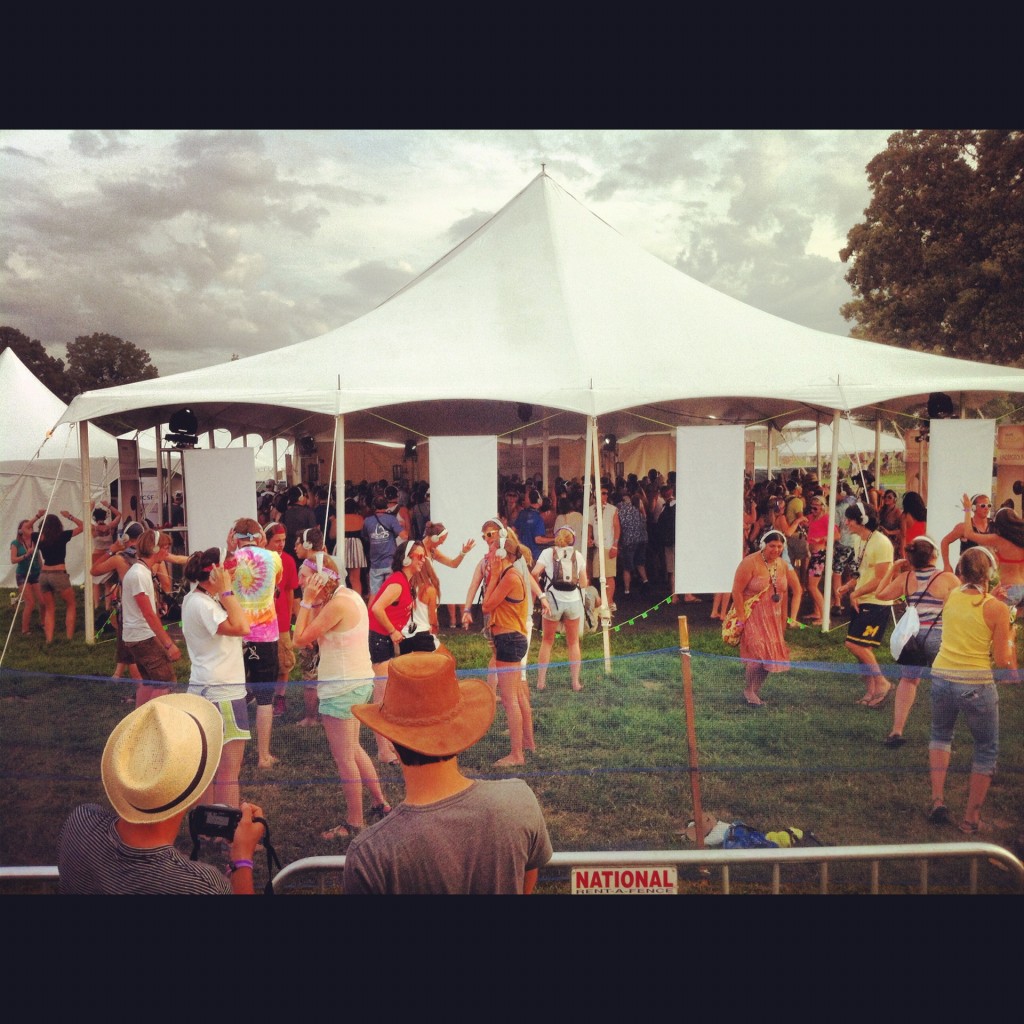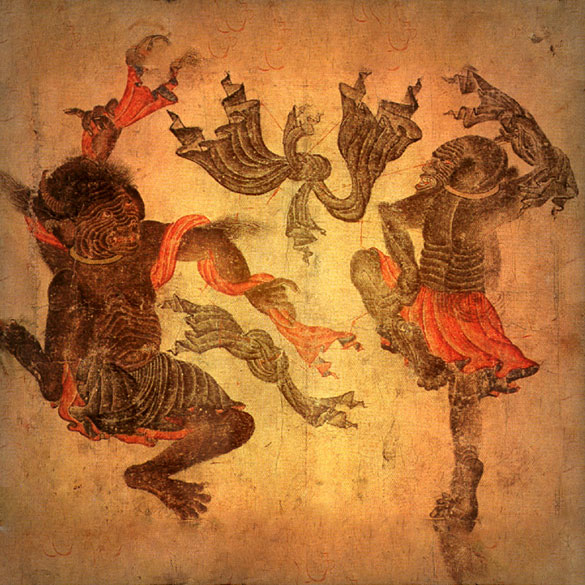By Ben Wilkes
Despite its remote location in Manchester, Tennessee, – a run-of-the-mill post-industrial American highway stop town where Wal-Mart is a central figure in the local economy – Bonnaroo continues, in its eleventh year, to be the standard bearer for North American music festivals. It may not be as hip as Pitchfork Festival in Chicago, or as sprawling and underground as SXSW in Austin, but the music industry and its critics pay attention to what happens on that farm.
Bonnaroo, produced by Superfly Presents (who also run Jazzfest in NoLa and Outside Lands in San Fran), grew to notoriety through its welcoming jam band atmosphere, but has since struggled to break out of a stereotype for booking predictable, mainstream acts without a cohesive theme or niche. While it certainly stuck to its roots in 2012 with obligatory sets from Phish, Umphrey’s Mcgee, and SOJA, it also provided a fairly comprehensive snapshot of the current indie music scene. Criticism for Bonnaroo has also stemmed from an alleged ignorance of hip-hop and punk, but with acts this year including Ludacris, Bad Brains, Kendrick Lamar, and The Black Lips, you can’t really complain.
But I will. Yeah, this is a best-of article, but you’ve read every other blog’s self-righteous opinion by now about exactly why Radiohead was so good on Friday night. I hope to give you a look at the people who are making music that matters right now, and an honest opinion about which bands to anxiously await a new single from, and which not to waste your precious internet-scouring time with. My authority on the subject may only be that I saw the festival go down from an “almost VIP” perspective – yeah, I was in that gated, yet near-empty pocket of breathing room at the front left of the stage. I think.
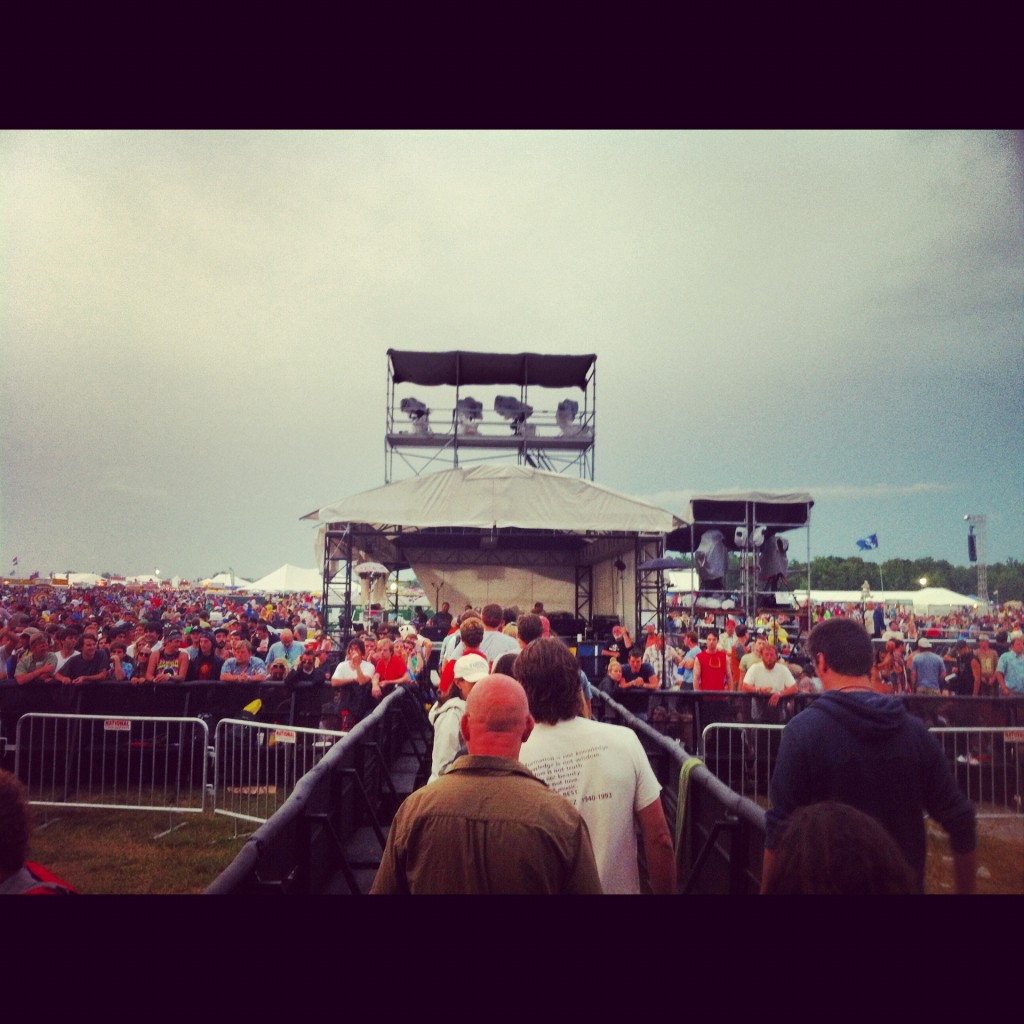
BLOOMS ::Phantogram – Bonnaroo’s line-up this time around was riddled with the aftermath of a year of one-hit wonders, a la Foster The People, The Temper Trap, and fun. This setting provided the perfect test for nubile hit-makers, thrown to the wolves to prove how sustainable their talent really is. If you’ve heard Phantogram’s banger “Don’t Move,” you’ve heard their potential. With a club-ready beat jammed with off-kilter rhythms and catchy samples, Sarah Barthel’s soft, seductive catcalls leave us smitten. The duo made their dark, emotive mystique not feel out of place on a humid, summer night in Tennessee. I thought that was an accomplishment in and of itself. Phantogram’s songs are patient and beautiful; slow, sultry grooves reminiscent of a Glasser with raw rap drum tracks and layers of shoegaze dissonant fuzz mixed in. Like an urban, nocturnal Beach House, Phantogram reframed a few styles knocking around the scene with a darker lens and nailed it. As the crowd was gradually lured further into Sarah’s web, I found myself surrounded by full-body nods and stoned mouths gapped in awe. I’m still gawking.
tUnE-yArDs – Powerful front-women dominated this year’s festival, indicative of the role women play in today’s indie pop world; it seems the music industry is one place in our society where equal opportunity is truly realized. Merill Garbus of tUnE-yArDs exemplifies the rule. Merrill’s enthusiasm is palpable in the genuine expressions painted on her face throughout her performances and the gracious, loving relationship she has with her fans. In a way, each experience seeing tUnE-yArDs is unique because Merill creates the funky Afrobeats that drive her songs on the spot every time with the magic of a loop pedal. I get the impression that if all the band’s equipment was stolen before a show besides that pedal, it’d go off without a hiccup. Their thrifty use of beer bottles and sheets of metal to replace percussion instruments is impressive, along with their improvised intros that politely usher the audience into the next hit. There’s something very tangible and human about this music. It might be her playful, yet subtle and poignant lyrics that pinpoint modern social currents. “What’s a boy to do if he’ll never be a gangsta?” – addressing every white kid who grew up in the suburbs during the 90’s and liked Wu-Tang or “the worst thing about living a lie is just wondering when they’ll find out” in a song titled “My Country.” It’s this ability to really be in touch with our culture, accompanying fresh world-pop beats that make me believe this music is internationally marketable. I respect the hell out of these guys, enough to capitalize the correct fucking letters in their name every time I type it.
St. Vincent – Annie Clark has developed a captivating stage persona centered around her remarkable Berklee-trained riffing chops. Her jarring, strangely offbeat licks sound possessed, and she consequently performs rigid and erratic, as if a puppet controlled by a higher power. Dressed in all black, with a cute linen shirt neatly tucked into leather, studded shorts and textured tights running down to sexy high-heeled boots, she is both a guitar god and a fashion icon. In a world where we are flooded with images of our favorite artists on a daily basis, she blends aesthetic with musical style flawlessly. Clark is no air-headed, pin-up pop star, her songwriting is advanced, odd, and borderline genius. Collaborations can be a judge of the level of artistic company one belongs with and I look forward to spinning her album co-written with David Byrne, Love This Giant, due out in September. Her trippy, dissonant soloing style reminds me of Hendrix, and I would never use that comparison lightly. St. Vincent capped her refreshingly rock n’ roll performance with a crowd surf, guitar in hand, reassuring those who got to touch her that she is indeed physically still a human.
The Black Lips – After opening with “Family Tree,” the first cut off this year’s Arabia Mountain, and sending a sweat-soaked and mud-cracked crowd into the classic indie kid jump mosh (we were so thrilled to hear something a little punk), The Black Lips’ lead singer and guitarist Cole Alexander dryly remarked, “well folks, it ain’t perfect, but that’s rock n’ roll.” It was like the sky broke open and flooded anyone who’s ever felt unease about the computer’s effect on rock with an affirmation that there is hope. We didn’t care that they didn’t care, we were all just in it to have a good time. The Lips play well-written garage punk songs loyal to the godfathers of blues and southern rock; they call it “flower punk,” and as Ian Saint Pé (the other guitarist and vocalist) drawled it, “Y’all know what the first electronic music was? Rock n’ roll.” The boys have tamed a bit since their days of vomiting on the crowd and racing RC cars on stage, but fountains of beer-spit were occasional and flying rolls of toilet paper frequent – I was also quite impressed by Cole’s ability to spit loogies into the air and catch them in his mouth. The show had a raw energy that was welcome; you could really tell the guys were having fun up there, and their perennial closer, “Bad Kids,” left us all bummed that Mac Miller was on deck.
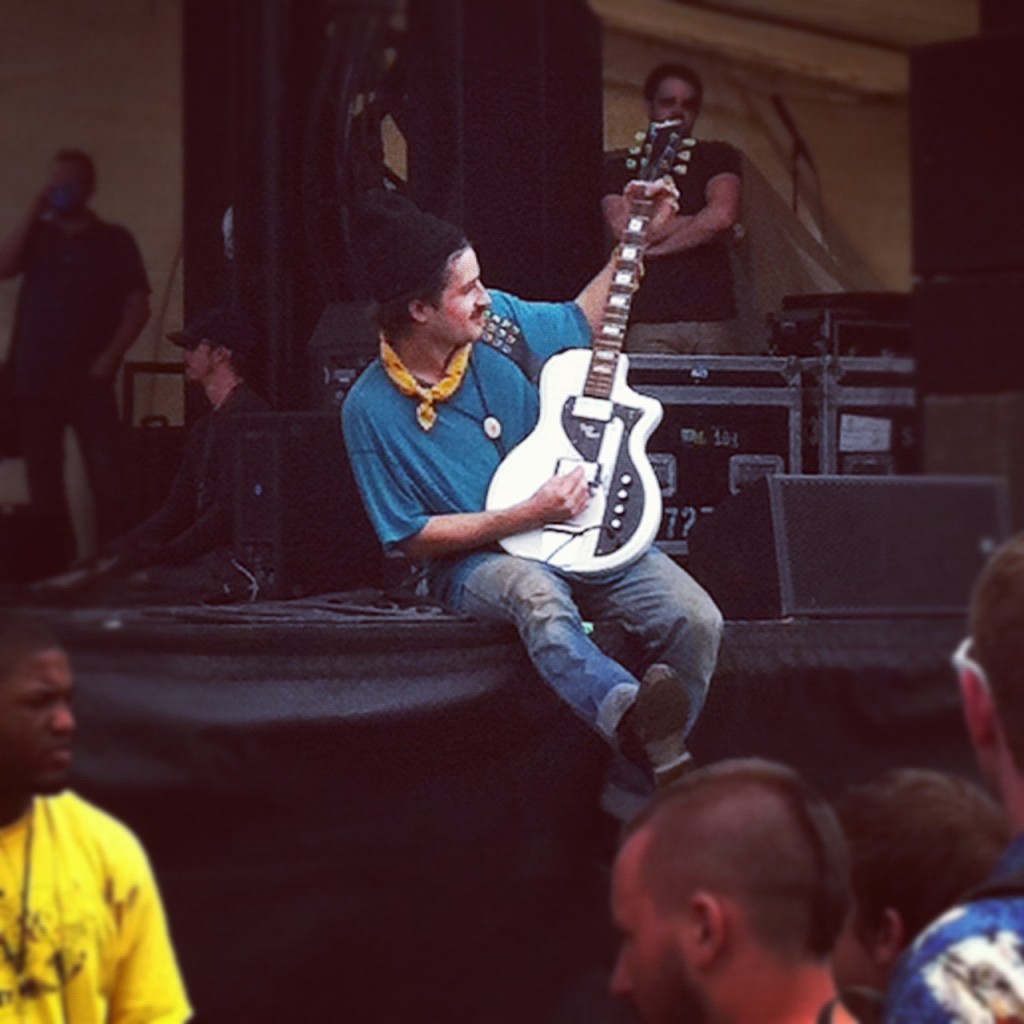
BUSTS ::
Dale Earnhardt Jr. Jr. – With a few exceptions, the era of guitar-driven rock is dying. The road to fame as an indie band in our digital world is to be Internet notable. This is achieved by creating music that is immediately accessible and catchy, as to be compatible with a generation that will listen to 30 seconds of your song to decide if you’re good. This forced-pop phenomenon has led to a scene-wide competition for the quickest, easiest hook, diminished the demand for subtle songwriting, and allowed over-production to strangle character. The result is beat-driven song-blasts crippled by cheap hooks and crowded melodies. In many cases, the unlimited access to music allowed by the Internet hurts bands, because they try to piece together too many influences, too many aspects of our cultural past into one conglomerate that is unfortunately limited by the constraints discussed above. Dale Earnhardt Jr. Jr., a name dripping with irony that isn’t incredibly relevant to them or funny in context, falls victim to these plagues. Swirling heavy dance beats, unaided by Bonnaroo’s consistent over-amplification of the bass; out-of place folk guitar; and cutely iconoclastic pop lyrics result in an imperfect alchemy. Lost in the sea of bodies without a friend as happens occasionally at Roo, I decided to lie down and relax in the adjacent field and felt assaulted by this weird bastard child of Cake and Sleigh Bells. I’m sure they have a super fun and catchy single.
GROUPLOVE – Don’t get me wrong, I fucking love “Colours,” but this show was just bad. That song has such emotional arena rock energy coupled with strong staccato attack and meaningful and germane lyrics; produced so well…It’s unfortunate that they will be forever relegated to our memories and archives of blogs. They simply could not capture the same energy of the recording live (even lead singer Christian Zucconi’s joyful scream was off) and after all, that song’s the only reason anybody showed up. Along with Young The Giant and fun., GROUPLOVE falls firmly into the recently developing indie genre: pop songs crafted by “indie kids” that get huge airtime on adult alternative stations that your mom listens to at work. Not that it’s bad music, it’s just spread too thin and relies too much on scoring that one big hit to be sustainable. It was obvious that the producer had put in more hours on the album than the band had. Their timing and balance were off and the songs just didn’t sound full and powerful like they had recorded, despite Bonnaroo’s apparent affinity for the womp. A shame, but a reality.
Two-Door Cinema Club – I stopped by this show having heard the radio-ready banger “Something Good Can Work,” but found my friend’s analogy of the band as a poor man’s Phoenix crushingly real. The group’s bouncy, electronic dance-pop is certainly enjoyable, but does little but recycle trite songwriting strategies. It lacks the complexity or uniqueness of sound we got from Phoenix and lead vocalist Alex Trimble has simply adopted Ben Gibbard’s lyrical and singing style from The Postal Service. Their music is polished and well-written, but comes across as an empty conglomerate of modern pop and remains utterly without a niche. Bands like Two-Door, with a heavy beat, noodley guitar lines, and hooky, effected vocals, are a dime a dozen these days and, frankly, uninspiring.
ZOMBIES ::
I came across multiple performers throughout the weekend that for one reason or another have either grown too big for their sound and/or are no longer influential players in the scene. I valued the opportunity to see these walking dead do their thing, but for each of them, I was left with the feeling that they were on their way out.
Feist –For those of us who fell in love with Feist on Let It Die or The Reminder, it is remarkably disappointing to hear the reinterpretations of her best songs that she plays live. She’s fleshed out her instrumentation and sound, even hosting a younger band of worshippers as a chorus of backing vocals, to fit her fame. Her songs are crafted and re-crafted to fill an arena setting and have in turn become more rock, less folk, and have lost some of the quirky, organic songwriting that made Feist so appealing. Similar to St. Vincent, she leads the class of musicians as fashion icons – I looked over during the show to see my girlfriend wearing the same pair of with-it ASOS shades that Leslie was up on stage. Many fashion blogs recommendations for festival wear are structured around Leslie Feist’s flowery, cosmopolitan hippie aesthetic. I’m happy for her and the international recognition she’s achieved, especially the fact that she doesn’t have to play “1,2,3,4” at every show anymore. However, some of the honest, endearing art folk edge to her music has been lost in her pursuit of fame and I’m not sure how much longer she can continue making as rewarding of music with her new broad reach, despite how good that riff in “The Bad In Each Other” is. Such is life…
Bon Iver – There is a group of folk singer-songwriters out now that really struck a chord with the populous in their first release (both Feist and Bon Iver among them), with an incredibly genuine and introspective sound that we can all relate to for whatever reason. Bon Iver had an almost cult mythology surrounding him with For Emma, Forever Ago, and his alleged retreat to a mountain cabin to spill his soul for us. Though Holocene was a blockbuster record and a fantastic sophomore effort, I think both moving forward from there and playing live will prove difficult for him. It is hard to recreate in person the intimacy felt listening to his songs on recording. Housed on the What Stage, Bonnaroo’s biggest venue, Justin Vernon and crew (including Richmond, Va and VCU jazz giant Reggie Pace of NO BS Brass Band on trombone) struggled to make his graceful, muted sound fit a massive arena setting. Maybe it just doesn’t match my personal image of him anymore and we have to give our beloved artists room to grow, but hearing Bon Iver & His Orchestra playing the smooth 80’s-worship jam “Beth” at that enormous stage, it just felt like something had gone terribly wrong. Justin was aided by the emotionally-charged, light rain that caressed our aching bodies as a magenta sunset winked away over the lush fields we sat in, which is assuredly the best setting to see him in, but I think I’d rather see him perform more in the vein of Iron & Wine: stripped down and honest to the music he makes. He’ll ride the success of his latest for a few years I’m sure, but I’m quite curious to see how he’ll follow up such universal approval – I think he’d have better luck getting smaller rather than bigger in scope; after all, why would you want to do what we expect you to?
Mogwai – I’m still convinced some of the best live performances out there are that of the post-rock world. The ebbs and flows of energy just envelope you in a way that’s hard to replicate. I think what’s so great about Mogwai is their ability to straddle the line that defines those in this genre, between the absurd for the sake of art a la Godspeed You! Black Emperor and the blaringly emotional and predictable loud/ soft transitions of Explosions in the Sky. They also have a bit more of a metal-tinged grit than their contemporaries, which made more sense when I saw their 90s grunge appearance. There was something very endearing about their unassuming, regular guy demeanor – they didn’t fill their show with useless banter; rather, limited discussions to “Cheers” and “Thank you” in attractive Scottish accents. Of course, the bass was too high, but the boys gave a good show, playing across their fairly prolific discography and closing with the raw head-banger “Batcat.” Despite musical chops entirely in tact, I got the feeling these guys were getting a little old and a little out of style. This was by far the least crowded show I saw and the only where space was available under the shade of the tent. I guess it might be that the post-rock thing is played out at this point in favor of faster-moving, more dance-oriented instrumental music, but I’d like to see the genre pursued more. These guys had a great run of it and might soon have to pass the torch to some younger, more experiment-minded musicians.
